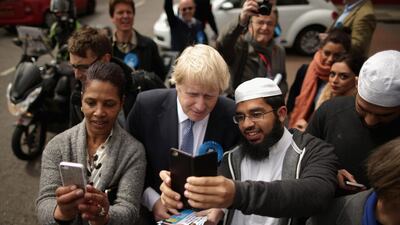Muslim leaders have dismissed as flawed a recent survey that claims the community could hold sway in a quarter of constituencies in Britain’s closely fought general election on Thursday.
The findings by the Henry Jackson Society, a neoconservative research body, are based on parliamentary seats where the number of Muslims among the electorate is greater than the majority achieved by winning candidates at the last general election, in 2010.
Serious misgivings about the survey were raised by the Muslim Council of Britain, an umbrella group for at least 500 mosques, associations and schools.
Miqdaad Versi, assistant general secretary, told The National he felt it relied on "poor methodology" and seemed consistent with the approach of a society that had been seen by Muslims as "scaremongering".
Speculation on how British Muslims may vote has not previously been a feature of the campaign. Coverage of the Henry Jackson Society’s analysis is typified by right-wing newspaper headlines such as The Daily Mail’s “Muslim vote could decide 25 per cent of seats”.
“Muslims do not represent a homogenous voting sector,” Mr Versi pointed out. “There are big differences of opinion.”
Many Muslims are deeply concerned about such issues as the effect of discriminatory counterterrorism measures, or “the right to live our faith”, he said. Others attached more significance to economic policy, or a perceived need to register a protest vote against mainstream parties.
Alan Mendoza, executive director of the Henry Jackson Society and a Conservative candidate in London, acknowledged that not everyone would accept there is a “Muslim vote” in any case.
He also pointed out that the research, claimed by the society to be “the most comprehensive study of its kind” into the potential political influence of minority religions, also examined the significance of the voting power of Jews, Hindus and Sikhs.
Mr Mendoza said the study provided “ a fascinating look at Britain’s changing religious demographic dynamics and how they are concentrated in relation to political power”.
“Although religious affiliation is only one of any number of factors that explain how people vote, for the first time we now have a basis on which to examine the influence of ‘religious issues’ in that process,” he said.
“Britain is changing rapidly. Will our political parties be up to the challenge of recognising that process?”
The analysis found that in 159 of Britain’s 632 constituencies, the number of Muslim voters was greater than the margin of victory in 2010. Of these 159 seats, 90 were considered marginal.
In 51 constituencies – which make up eight per cent of the total seats, and where 40 of them are considered marginal – the number of Hindu voters exceeded the 2010 margin of victory. Sikh voters, meanwhile, exceeded the margin in 34 constituencies, Buddhists in 15 and Jews in 13.
Researchers found many examples of Muslim voting intentions affected by perceptions of British foreign policy and concerns about Islamophobia. Some Muslims and Jews would weigh up which party seemed closer to their own views on the Israeli-Palestinian issue, they say, while some Indian voters attached importance to politicians’ views on the Indo-Pakistani dispute over Kashmir.
Mr Mendoza agreed that many factors influenced voting intentions, beyond those attributable to religious belief.
But he said that while Britain’s parliamentary constituencies remained overwhelmingly Christian, minority religions had a “potential influence on politics that far exceeds their relative size of the population [collectively 7.8 per cent] on account of their high presence in marginal seats”.
Mr Versi of the Muslim Council said research after the 2010 election had shown that around 60 per cent of Muslims who voted favoured Labour. He predicted that this proportion was likely to be repeated.
Mr Cameron, who has said he will not serve as prime minister beyond a second term should he prove triumphant on Thursday, has urged minority ethnic voters to recognise that the Conservatives represent their values more closely than any other party.
After five years of coalition between the Conservatives and the centrist Liberal Democrats, another tight outcome, and probably a hung parliament, is widely predicted.
The closeness of the election is demonstrated by recent opinion polls giving results ranging from a six-point lead for the Conservatives to a three-point advantage for the left-wing Labour opposition.
Neither party appears likely to gain an absolute majority in parliament. Much may depend on how many traditional Conservative voters defect to the nationalist and anti-European Union UK Independence Party (Ukip). Polls in Scotland suggest the Scottish National Party (SNP) – resurgent under a new leader, Nicola Sturgeon, only a few months after defeat in last year’s referendum on independence – may seize the balance of power, especially in the event of Labour being the largest party, with massive gains giving it all or almost all of the 59 seats in Scotland.
This has been a particularly thorny election issue for Labour with Conservatives claiming that Ms Sturgeon’s party would be able to dictate policy in key areas including defence, health and the economy.
Although Labour leader Ed Miliband has ruled out a coalition with the SNP, his hand could be forced on key parliamentary votes by a need to rely on Ms Sturgeon’s support.
foreign.desk@thenational.ae


